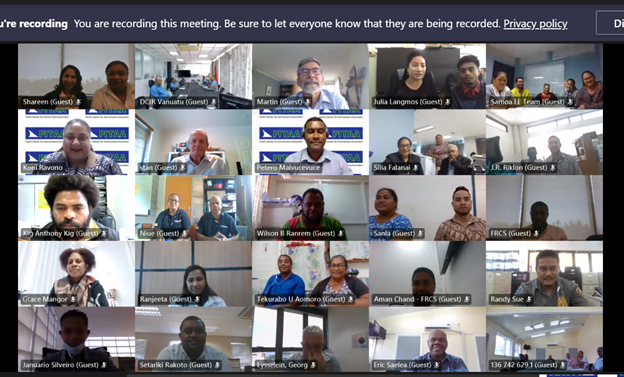
Suva, Fiji: With COVID-19 casting a long shadow on economic activities, tax administrations in the region have attended a webinar to discuss ways to improve compliance, collect revenue and ultimately enable the governments to continue providing essential services.
Forty-nine (49) tax officials from across fourteen (14) Pacific tax administrations have been part of a four day webinar, “Improving Compliance in the Large Taxpayer Segment”, which started on Thursday, February 25 and ended on March 3.
A joint initiative of the Pacific Islands Tax Administrators Association (PITAA) Secretariat and the Pacific Financial Technical Assistance Center (PFTAC) of the International Monetary Fund (IMF), the webinar exploring potential areas of further improvement in the compliance of the large taxpayer sector and how the compliance model could be applied to the sector.
“Large taxpayers are an important segment in tax administrations as they contribute at least 60 per cent to 80 percent of administrations revenue even though they comprise of 20 percent of the taxpayer pool,” PITAA head of secretariat, Mrs. Koni Ravono said.
Mr. David Kloeden, PFTAC Coordinator, reinforced PFTAC’s commitment to strengthening revenue administration in the Pacific including building capacity in core tax functions with this regional workshop being the first event for the year with a number of events planned for the year.
The workshop covered topics such as the importance of large taxpayers in reprioritizing revenue collections during COVID-19, key features of an effective large taxpayer compliance strategy and stakeholder relationship management.
Participants also discussed ways to collect data, which could be used to map strategies for revenue collection as well detection of non-compliance.
The workshop was facilitated by IMF Short Term Consultants Mr. Stanley Shrosbree and Mr. Martin Scott.
“Without data we “don’t know our business”,” says Mr. Shrosbree. “Before making a decision for focusing on Large Taxpayers we need the data to “tell us the story”. Tax non-compliance is a range of activities that are unfavorable to a state’s tax system. This may include tax avoidance, which is a tax reduction by legal means, and tax evasion which is the criminal non-payment of tax liabilities. Using data is crucial to identifying non-compliance.”
For additional information, please contact Petero Maivucevuce [Training Coordinator/ Office Administrator- PITAA Secretariat] on email pmaivucevuce@pitaa.org.
-END-